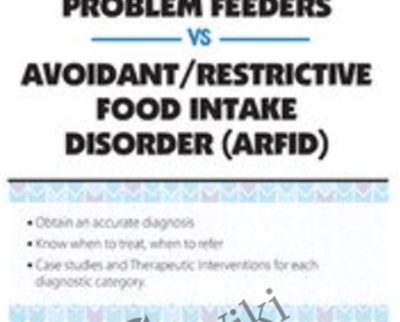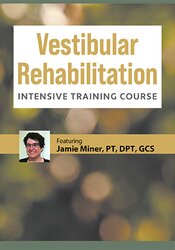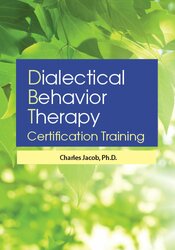Picky Eaters vs Problem Feeders vs Avoidant/Restrictive Food Intake Disorder (ARFID) – Dr. Kay Toomey
Original price was: $99.99.$27.00Current price is: $27.00.
Picky Eaters vs Problem Feeders vs Avoidant/Restrictive Food Intake Disorder (ARFID) – Dr. Kay Toomey Download. Pediatric feeding disorders make it difficu…
Salepage link: At HERE. Archive:
Pediatric feeding disorders make it difficult or impossible for a child to eat, drink, or digest food normally, often compromising their health and development.
The limited intake seen in these children reflects concerns such as:
- Food aversions
- Lack of interest in eating or food
- Avoidance based on sensory characteristics of food
- Fear of choking or other adverse consequences
- Serious medical and psychological complications consist of:
- Severe malnutrition
- Growth failure
- Marked interference with psychosocial functioning
Feeding expert, Dr. Kay Toomey, who has over 30 years of clinical experience assessing and treating children with a wide range of feeding challenges, will show you clear guidelines to utilize the appropriate therapy approach.
Learn practical therapeutic interventions to use with children from each diagnostic group and ways to improve family meal routines and increase children’s intake of more nutritious foods.
- Identify physical, motor, sensory, oral-motor, environmental, nutritional and behavior factors necessary to consider, to properly assess feeding problems.
- Delineate differential criteria for determining a child’s diagnosis as a typical eater, picky eater, problem feeder or a child with ARFID.
- Learn when to refer to a specialist for additional treatment
. Identify physical, motor, sensory, oral-motor, environmental, nutritional and behavior factors necessary to consider, to properly assess feeding problems.
2. Delineate differential criteria for determining a child’s diagnosis as a typical eater, picky eater, problem feeder or a child with ARFID.
3. Evaluate the diagnosis of ARFID to discover sensory sensitivity, fear of aversive consequences and/or apparent lack of interest in eating or food.
4. Utilize practical treatment strategies to advance children’s feeding skills, improve family meal routines and increase children’s intake of more nutritious foods.
5. Conduct more thorough and accurate diagnoses, to implement the right treatment approaches for the distinct types of feeding/eating problems.
6. Discriminate when a child needs additional evaluation and intervention by specialists for more intense treatment.
Prevalence of the Problem
- Picky eating
- Problem feeding
- ARFID
The Complexity of Feeding/Eating
- 7 areas of human function
- How children learn to eat (or not)
How to Complete a Comprehensive Feeding Assessment
- Medical/organs
- Oral-motor skills
- Sensory-motor skills
- Postural and motor skills
- Nutrition
- Learning/cognition
- Environment
Differential Diagnoses Criteria, Research and Limitations
Picky eating
- Able to tolerate new foods on plate
- Decreased range or variety of foods that will eat
- Frequently eats a different set of foods than the rest of the family
Problem feeding
- Restricted range or variety of foods
- Refuses entire categories of food textures
- Cries and “falls apart” when presented with new foods
ARFID
- Accept a limited diet in relation to sensory features
- Food refusal is related to aversive or fear-based experiences
- Extreme pickiness; distractible and forgetful
Treatment Approaches – Align Treatment w/ Diagnosis
- Systematic desensitization
- Flooding/escape extinction
- Eating disorders
Case Studies: When Assessments Go Well, and When They Don’t
Picky eating –
- Case 1 = 2 ½ year old male with limited number of accepted foods he will eat, variable eating from one day to next, issues staying at the table
- Case 2 = 2 ½ year old female with restricted food range, over reliance on liquids for calories and swallowing assistance
- Case 3 = 9 year, 8-month-old male with lack of healthly proteins per parents, and no vegetables in his food range
Problem feeding –
- Case 1 = 3 year, 10-month-old female with a G-tube, born at 26 weeks gestation, complicated medical history
- Case 2 = 4.25-year-old female born with congenital Rubella, poor weight gain, restricted food range, episodes of gagging and coughing, episodes of refusing to eat
ARFID –
- Case 1 = 15-year-old male with chronic “chok-y” sensation, significant weight loss, hospitalized in an Eating Disorders program
- Case 2 = 13-year-old male with difficulties eating food at school, restricted food range per parental report, refusal to eat vegetables
Practical Feeding Strategies for Pediatric Feeding Disorder
Routines and environmental supports
Matching foods to a child’s skillset
Reinforcement
Management of maladaptive behaviors
When to Refer
Red Flags
Picky Eater vs Problem Feeder criteria
Here's an overview of the prominent keywords and a list of famous authors:
Business and Sales: Explore business strategies, sales skills, entrepreneurship, and brand-building from authors like Joe Wicks, Jillian Michaels, and Tony Horton.
Sports and Fitness: Enhance athleticism, improve health and fitness with guidance from experts like Shaun T, Kayla Itsines, and Yoga with Adriene.
Personal Development: Develop communication skills, time management, creative thinking, and enhance self-awareness from authors like Gretchen Rubin, Simon Sinek, and Marie Kondo.
Technology and Coding: Learn about artificial intelligence, data analytics, programming, and blockchain technology from thought leaders like Neil deGrasse Tyson, Amy Cuddy, and Malcolm Gladwell.
Lifestyle and Wellness: Discover courses on holistic health, yoga, and healthy living from authors like Elizabeth Gilbert, Bill Nye, and Tracy Anderson.
Art and Creativity: Explore the world of art, creativity, and painting with guidance from renowned artists like Bob Ross and others.
All the courses on WSOlib are led by top authors and experts in their respective fields. Rest assured that the knowledge and skills you acquire are reliable and highly applicable.
Specification: Picky Eaters vs Problem Feeders vs Avoidant/Restrictive Food Intake Disorder (ARFID) – Dr. Kay Toomey
|
User Reviews
Only logged in customers who have purchased this product may leave a review.

Original price was: $99.99.$27.00Current price is: $27.00.












There are no reviews yet.